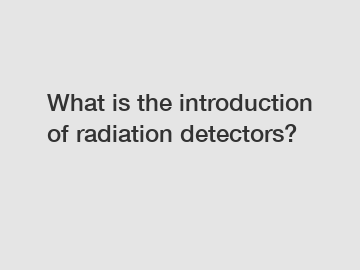What is the introduction of radiation detectors?
Radiation detectors play a crucial role in ensuring the safety and well-being of individuals in various industries. These devices are designed to detect and measure the presence of ionizing radiation, such as gamma rays, X-rays, and alpha and beta particles. By quickly and accurately identifying radiation levels, radiation detectors enable workers and the general public to take appropriate protective measures and prevent potential health risks. In this article, we will explore the importance of radiation detectors, their types, and their applications in different fields.
Types of Radiation Detectors.
1. Geiger-Muller Counters.

Geiger-Muller Counters, also known as Geiger Counters, are the most commonly used radiation detection devices. They consist of a gas-filled tube with a wire electrode at its center. When ionizing radiation enters the tube, it ionizes the gas, producing an electrical pulse that can be detected by the device. Geiger-Muller Counters are portable, user-friendly, and provide a quick and simple method for detecting radiation. They are commonly used in laboratories, hospitals, and nuclear power plants.
2. Scintillation Detectors.
Scintillation detectors are another type of radiation detectors that use crystals or liquid scintillators to detect radiation. When ionizing radiation interacts with the scintillation material, it emits flashes of light. These flashes of light are converted into an electrical signal by a photomultiplier tube, allowing the radiation to be measured and analyzed. Scintillation detectors are widely used in environmental monitoring, radiation therapy, and nuclear medicine.
3. Proportional Counters.
Proportional counters operate on the same principles as Geiger-Muller Counters, but they are more sophisticated. These detectors can differentiate between different types of radiation and provide information about their energy levels. Proportional counters are commonly used in research laboratories and medical facilities for precise measurements of radiation.
Applications of Radiation Detectors.
1. Nuclear Power Plants.
One of the primary applications of radiation detectors is in nuclear power plants. These detectors are used to continuously monitor the radiation levels within the plant's facilities to ensure the safety of workers and prevent any potential leakages or accidents. Radiation detectors are also used during routine inspections and maintenance activities.
2. Medical Field.
Radiation detectors play a vital role in medical applications such as radiation therapy and nuclear medicine. They are used to measure the radiation dose delivered to patients during cancer treatments, ensuring that the prescribed dose is accurate and safe. In nuclear medicine, radiation detectors help in imaging techniques like positron emission tomography (PET) scans.
3. Industrial Radiography.
Industrial radiography involves the use of radiation sources to examine the interior of materials, such as metal pipes and welds, for defects or structural integrity. Radiation detectors are used to monitor the radiation levels and protect the workers involved in this process. By using radiation detectors, industrial radiographers can ensure the safety of both the workers and the public.
In conclusion, radiation detectors are essential tools to measure and monitor the presence of ionizing radiation. Geiger-Muller counters, scintillation detectors, and proportional counters are among the commonly used types of radiation detectors. These devices find applications in various fields, including nuclear power plants, medical facilities, and industrial radiography, ensuring the safety and well-being of individuals. With the increasing concern about radiation exposure, the importance of radiation detectors cannot be overstated.
If you have any further inquiries or would like to learn more about radiation detectors, please do not hesitate to contact us.
Contact us to discuss your requirements of acousto-optic q-switch driver, introduction to radiation detectors, acousto-optic q-switch driver. Our experienced sales team can help you identify the options that best suit your needs.
154
0
0

Comments
All Comments (0)